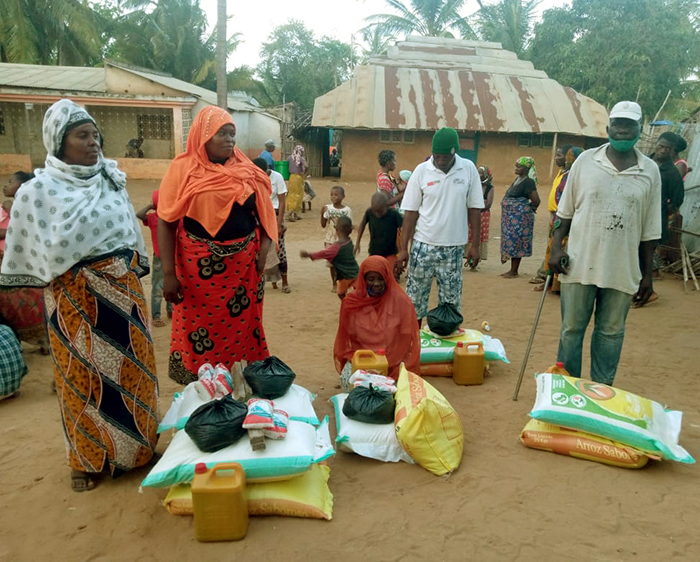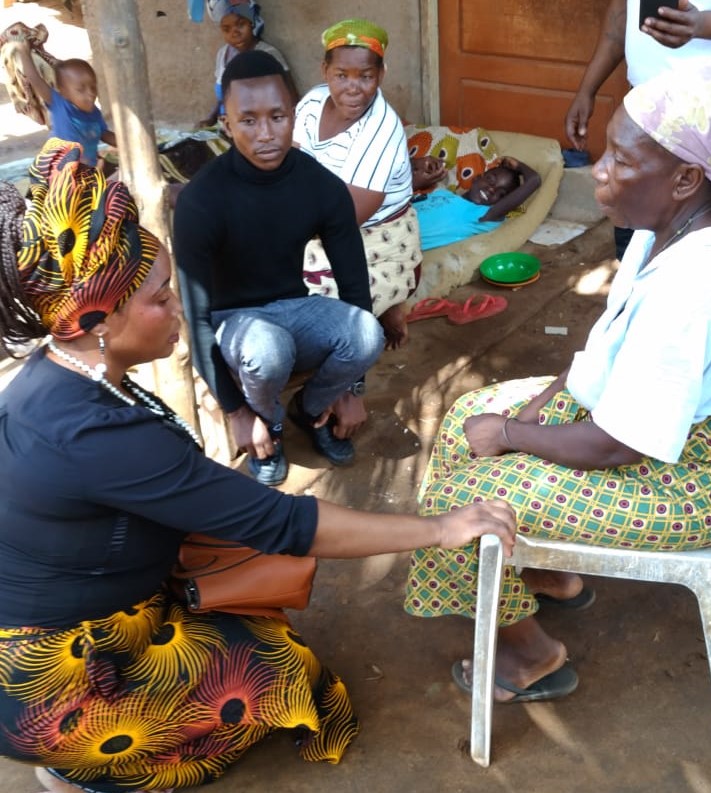This week Mozambique has again been in the world news following the horrific attacks by insurgent groups in Palma in the northern region of Cabo Delgado. The growing conflict in the region has added to the devastation caused by cyclones and severe flooding in recent years, as well as the Covid pandemic. Throughout all these challenges, the Anglican Church in Mozambique continues to serve the communities, bringing hope and practical help.
Since 2017, widespread violence and insecurity in Cabo Delgado Province, with attacks by armed militants and military reprisals, has left more than 2500 people dead and around 700,000 internally displaced peoples (IDPs). They are fleeing to other areas within Cabo Delgado and to the Provinces of Nampula and Niassa as well as into Tanzania. Crops and property are also being destroyed in the conflict, all creating a major humanitarian crisis.
The Archbishop of Canterbury, Justin Welby, is deeply concerned for the situation in northern Mozambique, supporting a statement by Southern African Christian leaders urging every sector to address the root causes of the violence, and grieving with all those who are displaced and traumatised.
Bishop Manuel Ernesto, Bishop of the Anglican Missionary Diocese of Nampula, was interviewed on the BBC World Service on 13 March 2021. Bishop Manuel described how the situation had deteriorated over time, as more and more people were being displaced by the violence from their farming and fishing areas. He explained: “Northern Mozambique, especially Cabo Delgado, is a very isolated place… The situation is disturbing for the local communities as we have been living here as Muslims and Christians as one family for many years…. There is a humanitarian response… but the situation is desperate and the need is enormous. The churches are doing their best but we just being exhausted in terms of the situation on the ground.”
The churches are also playing an increasingly important role in building community dialogue, peace and reconciliation, alongside other faiths. The three dioceses in Mozambique have jointly created the Anglican Peace and Reconciliation Initiative for Mozambique and Angola (APRIMA). The bishops have been speaking on radio and TV to spread messages of peace and to discourage youth from getting caught up in the conflict. Bishop Manuel is now chairing an interfaith network of Peace Clubs that were active nationally during earlier times of conflict and have now restarted activities in response to violence in Cabo Delgado. Working through the Christian and Islamic Councils of Mozambique and Sant’Egidio, the Peace Clubs aim to support IDPs, convene key faith and traditional leaders, strengthen community resilience and engage local youth. The Archbishop of Canterbury’s Reconciliation team at Lambeth Palace work closely with the Church in Mozambique on this peace building work.
In a recent call with the Anglican Alliance, a group from around the Communion heard more about the situation and the Church’s response from the three Anglican Bishops in Mozambique, Bishop Carlos Matsinhe of Lebombo Diocese, Bishop Vicente Msossa of Niassa Diocese and Bishop Manuel Ernesto of the Missionary Diocese of Nampula. Bishop Carlos explained that the majority of people have fled from the conflict and now the safer districts are overloaded, with an urgent need for food and shelter.

People who have fled their homes in Cabo Delgado receiving food, water purifiers and hygiene supplies from the Anglican Church. Photo credit: Anglican Missionary Diocese of Nampula
The situation for the displaced peoples and their host communities is very challenging indeed. The UN High Commission for Refugees reports: “Key needs and challenges faced by IDPs and host communities in relocation sites continue to be related to lack of shelter facilities and access to basic services. Vulnerable and traumatized individuals, including children and survivors of gender-based violence, are in particular need of basic services in the areas of protection, mental health and psychosocial support, education, health, food security, water, hygiene and sanitation.” (UNHCR Mozambique Update 3/3/21)
In the midst of this significant need and trauma, it has also been challenging to implement Covid-19 prevention activities, with a lack of face masks, sanitisers and access to handwashing facilities. Several areas where IDPs have joined host communities are also severely crowded. The increasing Covid restrictions have also impacted on people’s livelihoods.
The situation is also putting immense strain on the meagre resources of the host communities, alongside those displaced, and OCHA reports that overall 1.3 million people are in need of humanitarian assistance and protection in the three northern provinces of Mozambique, due to the armed conflict in Cabo Delgado. (OCHA 2/21)
According to the BBC, 97% of those who have fled their homes are now being sheltered by families in other communities (BBC Radio 4, 13/3/21). This is an extraordinary testament to the compassion, generosity and solidarity shown by families and friends in the host communities. It is also testament to the role that the churches and other faith groups are playing in helping to support community responses and to sustain their resilience.
According to the Anglican Bishops in Mozambique, the large humanitarian agencies find it challenging to reach many of the IDPs sheltering with extended family members, within the community rather than in camps. The churches are close to their communities and are helping to meet those urgent needs. They are also well networked with other churches, with Islamic organisations and with the government and some agencies.
The Anglican Church still has community structures and emergency committees in place after the recent cyclones. They are now working with others to improve the living conditions in resettlement centres through humanitarian support, while also building community livelihoods and self-reliance. Alongside their community dialogue initiative for building peace and reconciliation, they are offering psycho-social counselling for trauma healing, with leadership from Mothers’ Union.
The Anglican Alliance has been liaising with the Anglican Church in Mozambique and with Hope Africa in the Province of Southern Africa, convening other partners to hear together directly from the bishops.
Agencies and companion links around the Communion are responding, holding up the situation for prayer and support in solidarity for all that the Church is achieving on the ground. The various partners are helping to resource the remarkable response of the Anglican Church in Mozambique, as it works to build community resilience and peace initiatives, supporting IDPs and their host communities with food, water and shelter, with livelihood assistance and psycho-social care.
Here are details of some of the appeals:
Anglican Overseas Aid (Australia) is partnering with Nampula Diocese to support their work with IDPs and host communities. See here.
ALMA, the companion link partnership between the Anglican Dioceses in Angola, London and Mozambique, is calling for prayer with the hashtag #Pray4Cabo and supporting the Church’s response with the IDPs and host communities. See here.
Episcopal Relief & Development (US) is also partnering with the Church in Mozambique, as it builds disaster resilience working with communities. See here.
MANNA, which supports the work of Anglican church in Mozambique and Angola, is helping to support the Church’s holistic response to the crisis. See here. MANNA are also running a fundraising challenge, see here.
Please pray for the Church and people of Cabo Delgado and across Mozambique this Holy Week and Easter Season.

